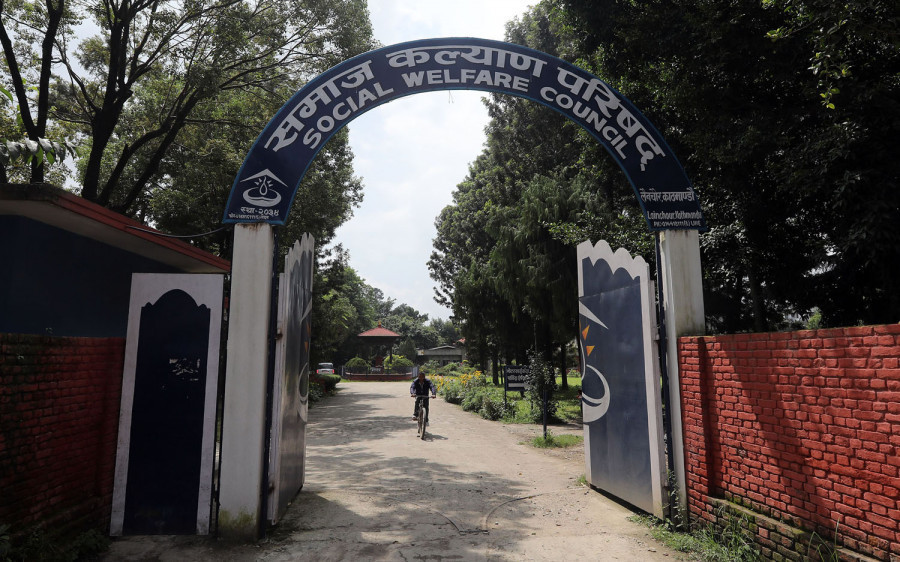National
Nearly two dozen foreign organisations leaving Nepal
Many of them are leaving citing funding crunch with some awaiting completion of post-earthquake recovery tasks.
Prithvi Man Shrestha
Around two dozen international non-governmental organisations are winding up their operations in Nepal, and have requested for termination of the general agreement signed with the Social Welfare Council.
The council, which regulates both domestic and international non-governmental organisations in the country, said a significant number of them have applied for termination of the general agreement with the council citing fund crunch while some of them want to exit Nepal after completing their tasks related to post-earthquake reconstruction and recovery.
According to the council, most of the foreign NGOs that had entered the country to help the post-earthquake recovery have already left.
A total of 23 international NGOs have applied for de-affiliation with the council. They include: Baptist Medical and Dental Mission International; Child Protection Centers and Services International; Americares Foundation Inc; Al-Khair Foundation; The International Legal Foundation; Next Generation Nepal; Medical Team international; Caritas Switzerland; Shangri-La Home; Himalayan Trust; Sustainable Environment and Ecological Development Society; Magic Bus India Foundation; Educate the children; Stichting Veldwerk Netherlands (SVN); Johanniter International; TMI Project; Jhpiego Corporation; Planate Enfants & Development; Esra Aid; WAMY; BNMT; Nepal Orphans Home and The Mountain Institute, USA.
These foreign NGOS are in the process of wrap-up evaluation whose report should be submitted to the council. Some are in the process of management of the goods and other property before departure, according to the council. These are the foreign NGOs that had applied for termination of general agreement over the last one year.
“A number of international NGOs have sought to wind up their operations in Nepal by handing over all tasks to their partner organisations so that office operation cost could be saved,” said an official at the council. “They are doing so, citing the fund crunch amid the impact of Covid-19 on their donors and reduced contribution from them.”
The official said that some are returning after completing their mission related to earthquake reconstruction and recovery. The 2015 earthquakes had killed nearly 9,000 people and damaged properties worth $7 billion, according to the Post Disaster Needs Assessment report released after the quakes. Till August 2019, a total of 32 international INGOs, mostly those related to earthquake recovery, had either left Nepal or were winding up their operations in the country, according to the Social Welfare Council.
Now, the funding crunch has been a more urgent issue for many international NGOs. “Many foreign NGOs are renewing their existing programmes instead of bringing new programmes citing the fund crunch,” the official of the council told the Post.
Pushkar Khati, member secretary at the council also admitted that new programme approval of the international NGOs has decreased but not significantly.
Funding crunch reported by international NGOs can also be assessed from the fact that their funding commitment has declined by more than three times during the first eight months of the current fiscal year.
According to the Social Welfare Council, it has approved a budget of Rs3.5 billion for 230 projects of international NGOs during the first eight months of the fiscal year compared to their budget approval of Rs12.19 billion for 240 projects during the same period last fiscal year.
This is the continuation of the trend observed in the last fiscal year 2019-20 when disbursement of funds by the international NGOs in the last fiscal year declined by nearly 39 percent, according to the Development Cooperation Report 2019-20 released by the Ministry of Finance on Thursday.
Representatives of international and domestic NGOs admitted that they are experiencing the funding crunch due to the impact of the pandemic on the donor countries and institutions that affected their contribution for charitable works.
Janes Ginting, vice-chair of the Association of International NGOs in Nepal, a grouping of foreign NGOs, said Covid-19 had certainly affected funding of the international NGOs significantly due to reduction of public and private funding and reallocation of budget for Covid emergency and recovery support.
“As a consequence, many international NGOs have to reduce their size, including cutting off international expats and local positions unfortunately,” Ginting, who is also the national director for the World Vision International Nepal.
According to a report prepared by Averthur NGO Consulting, a UK-based firm, in May 2020, income of the international NGOs originating in northern Europe was already declining since 2016 and the situation is likely to worsen due to Covid-19.
According to the report, individuals contributing to international NGOs were already declining while institutional grants and contract funding increased during the period from 2008-2015.
Except, the Médecins Sans Frontières (MSF)—also known as "Doctors Without Borders", international NGOS such as Save the Children, Action Aid, Care, Oxfam, the World Vision and Plan all were running with more institutional backing instead of individuals contributing to charity.
“The decline in institutional funding has suddenly got a lot harder with Covid,” it said. Even the local NGOs are also facing hardship to get funding from international sources as well. The local NGOs get funding from international resources as well as international NGOs having offices in Nepal as they employ local NGOs as partner organizations.
Jitram Lama, president of NGO Federation Nepal, a grouping of local NGOs, said he has been receiving complaints from the NGOs that their funding has been decreasing both from international resources as well as international NGOs operating in Nepal.
“This decrease is basically due to the impact of Covid-19,” said Lama. “With an United Nations Agency recommending Nepal for graduation to a developing country from the Least Developed Country status, Nepal may not be in the priority list of international donors.”




 9.89°C Kathmandu
9.89°C Kathmandu














